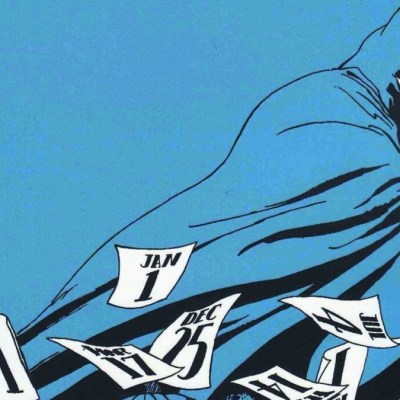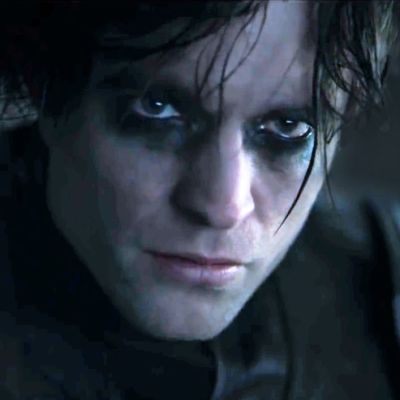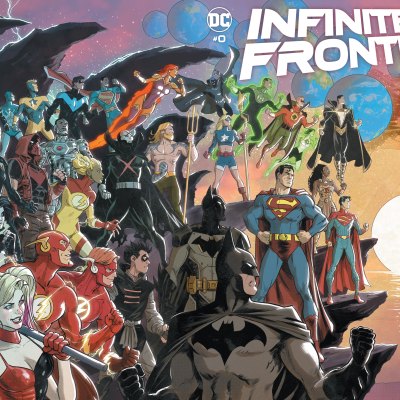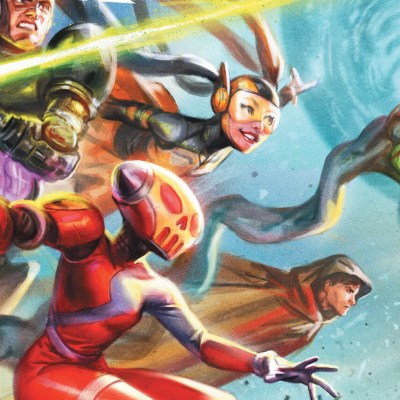How The Next Batman Was Born and What’s Next for Tim Fox in the DC Universe
John Ridley takes us through the creation of The Next Batman and reveals what's next for Tim Fox after the end of Future State.
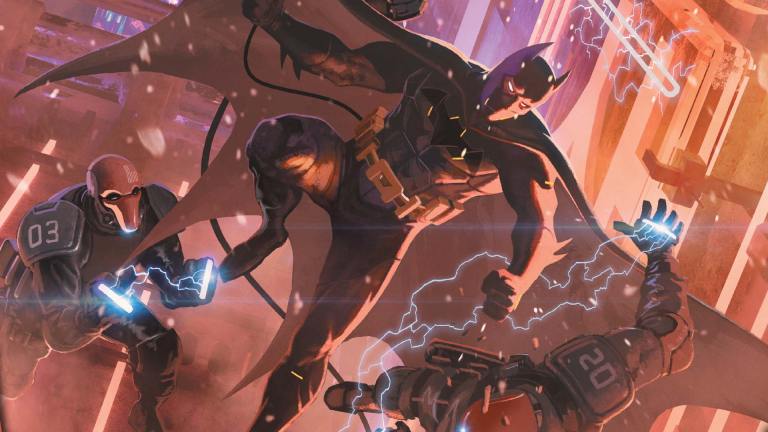
John Ridley is no stranger to telling stories. The Oscar-winning writer has spent his life weaving yarns both on the page and the screen. He’s also a lifelong comics fan and an accomplished comic book writer.
With The Other History of the DC Universe, he began reshaping one of the oldest and most seminal multiverses in the medium. As that series reaches its midpoint, he’s also just finished his first stint writing one of the most iconic heroes in the DC Comics trinity: Batman. But this isn’t your daddy’s Batman. In fact, Ridley, along with editor Ben Abernathy and artistic collaborator Nick Derington, have crafted a new vision of the Dark Knight.
In Future State: The Next Batman, Lucius Fox’s long absent son, Tim Fox, takes on the mantle. Despite the book’s futuristic setting, this is a back to basics take on the Bat, one that realigns the hero’s moral compass and pits him against a Gotham that hates heroes when the city needs them the most.
We took a deep dive into this new Caped Crusader, heroes, and family in an interview with Ridley. This interview has been edited for clarity and length.
Den of Geek: As soon as I saw that Tim Fox was the Next Batman, I was really excited to talk to you about that choice. You’ve spoken before about other lesser known Black heroes that meant something to you, who you’ve then later explored in your DC stories. Was Tim another one of those characters or was he someone who came up as you were researching and planning the series?
It’s been a really interesting journey getting to The Next Batman. I was working on The Other History and the second series of The American Way and I just felt very fortunate to be doing any of that. And at first I got these emails that Dan DiDio wanted to talk to me but I had to sign a nondisclosure agreement. But there was some weird thing where they were having trouble emailing it and this was prior to the pandemic, so finally they got all frustrated and were like, “Dan wants to have lunch with you.” We sat down and he said, “Oh we want you to write Batman.” That would have been tremendously cool in itself, but they said, “We want to approach Batman in a different way. We want Batman to be a character of color. But he’s going to be Batman. It’s not going to be an Elseworlds story, it’s not going to be, you know, the Dark Knight having his back broken. It’s not going to be temporary.”
Everything about it was trying to find the right way to express Batman. Who is Batman who’s a person of color? Not replacement Batman, not fantasy Batman, it’s going to be Batman. Going back a little bit, everybody in DC was very excited about The Other History. And initially the approach was, “Well, we’d love for you to create the next great DC comic book character.” That was the initial conversation before it became about Batman as a person of color. Initially, when Dan and Jim Lee approached me with that idea I was like, “Wow, I don’t know if I want to do that.” I know it sounds like a great opportunity, but I sincerely felt like, “Well, I’m too old to be writing a character that hopefully the next generation of comic book readers are going to want to be involved with.” Honestly, I think trying to create the next great character is a great way to fail. Anytime anybody in any space says, “I’m gonna do the next great whatever,” it’s just an opportunity to embarrass yourself.
So when they first approached me, I said, “I don’t know if I’m gonna be the right person.” And ironically both Jim and Dan said to me, “John, because you have that attitude, that’s all the more reason we feel like you’re the right person.”
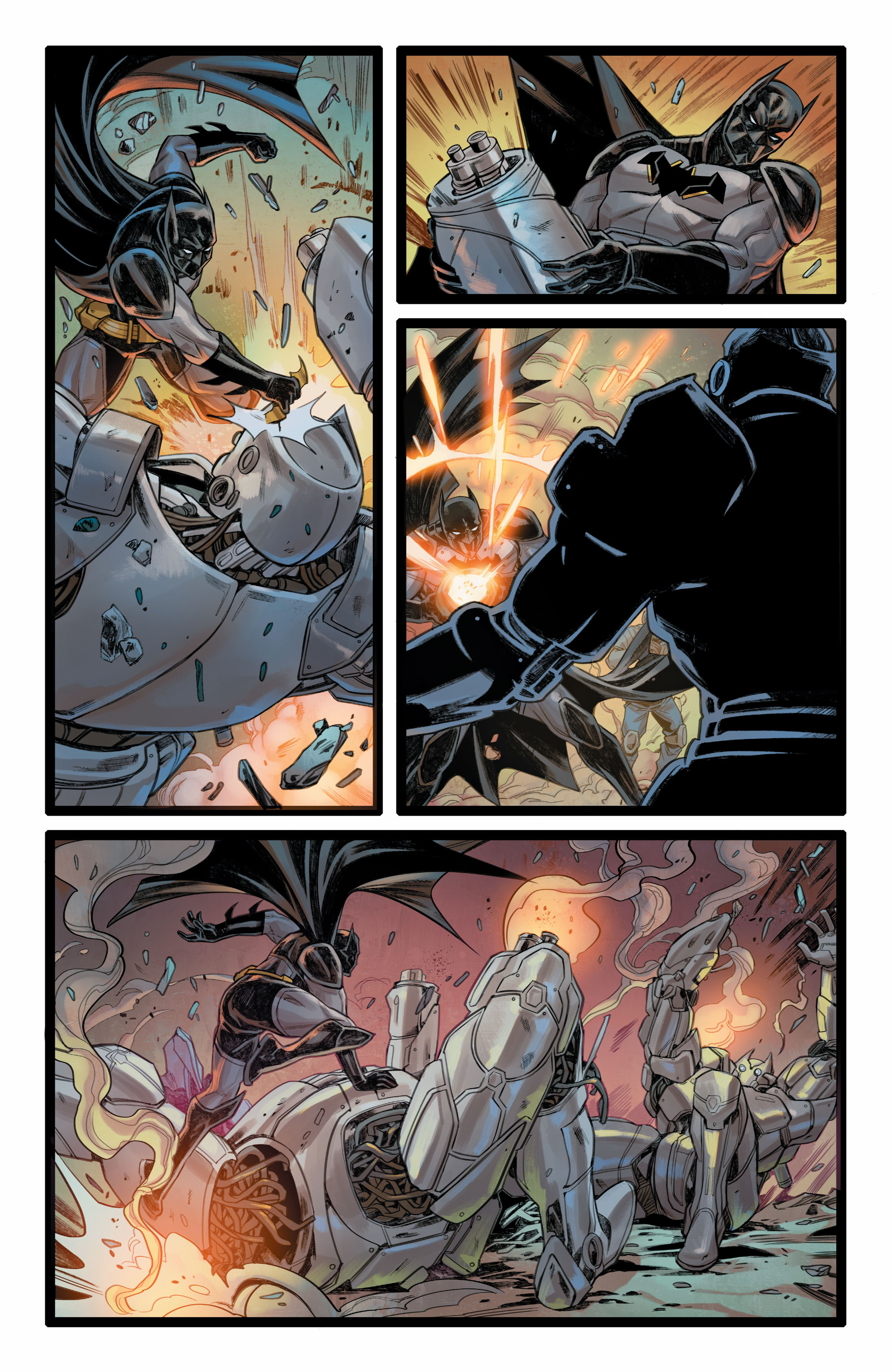
That was that. And then, you know, months later Dan sits down and says, “Hey, we want you to do Batman. But we want you to do the next Batman.” We didn’t even have that title at that point but that was the phraseology he used. Then there were all of these things that happened with what people thought or what was meant to be 5G, and then Dan leaving the company and all of these changes. But what never changed was the desire to have a next generation of heroes. And one of them was going to be Batman and he was going to be a person of color.
Then we really got into who this person was going to be. Ben Abernathy is the group editor and I have a long history with him. Frankly, I wouldn’t be writing comic books if it weren’t for Ben, so I was very excited when he was going to be the group editor. He really was instrumental in saying, “I think that the right character should be Tim Fox.” The idea that one of the Fox sons should be Batman was a no-brainer. The conversations were out there and they were unmissable. But for me and Ben, Tim was the correct way to go.
He was always the second son. He was always this kid who just did not get along with his father. Who had divergent views about the family and the family status, and concepts of money and wealth and society. But also he disappeared for a long period of time. One of the things that was really fun for me on The Other History was leaning into things that happened in the DC Universe that may have happened because a character’s book got cancelled or that storyline just dropped away. And instead of ignoring it, how do you embrace things that happen in real life but really turn them into narrative arcs? And with Tim disappearing from the DC Universe for decades, why was he gone? Why did he go away? So using all of that negative space and saying, “Okay, we’re going to fill that void.”
You straddle that line, like so many of us, of being both a creator and a fan. So what’s it been like for you being a part of crafting this new DC Trinity?
It’s been great in every sense, starting with being able to write a Batman comic. Being able to write Batman who is a person of color. Being able to embrace the past as well as the future. To have a character like Renee Montoya become the Commissioner. And what that means as a legacy character to embrace the entire Fox family. To be able to say, “Okay, this is what Tanya actually does for a living, her attitudes, her points of views. Here’s Tiff as a person. Here’s Tam, who’s going through this crisis that everybody is focused on. Here’s Luke and his attitude. But then here is Tim, who’s not wholly a new character, he’s obviously existed before.” To really embrace what’s happened with the Fox family and Gotham Future State. But to have a Batman who’s got a different attitude, a different approach, and a different belief system.
Things that happen in Future State are not a destiny that cannot change. What happens there doesn’t mean that it has to happen when we come back to a regular timeline. But what’s interesting is that there’s the opportunity to say, “Well, these are things that could happen.” This is sort of the Ghost of Christmas Future, and the things that work and the things that fans like, we can embrace those and we can use those as sort of a guiding light. We’re going to arrive at some of these elements. But more importantly it’s a way of saying to fans, “Look, here’s the durability of these characters.” They’re so far in the future that we’re probably never gonna see them, and they’re probably never going to be part of a timeline. And I hope I’m not giving anything away but the Magistrate, that program, those things, they’re on the horizon. A lot of what fans are reading, it’s not fantasy on top of fantasy. It’s going to happen.
It’s like seeing the prequels in Star Wars. You can argue about their execution, but there’s something that was really galvanizing and curious about seeing how Anakin becomes Darth Vader. There’s something about knowing the inexorable march towards something that’s really heartbreaking and sometimes really exciting for a reader because you know something that the principal characters don’t. We’re going to arrive at these moments and it’s really exciting.
Jumping off that a little, you mentioned Jace/Tim being a different kind of Batman, and we see that during Future State. Positioning him against the militarized private police of the Magistrate feels very timely and relevant. Could you talk a little about bringing that aspect into your Batman?
There’s certainly a timeliness in so many ways when you talk about privatization of police, the militarization of police, the over-policing of some neighborhoods. So there’s a relevancy to a lot of these stories that I just really appreciate. Whether it’s Batman, or whether it’s any of these characters in Gotham, there’s just an immediacy. I think that’s just good for audiences the same way when you think about the big rise of heroes, a lot of their real rise was during the Second World War. They had to fight real evil, they had to fight the Nazis, they had to fight in the war, they had to inspire Americans that we’re all in this together, and everything we did matters, and we certainly could use more of that right now.
Beyond that, though, there are elements within Future State that I just think are really interesting because they force the heroes to go back to their origins. There was a time when Batman didn’t have friends in the police department. He was a vigilante, he was an outsider, and he really had to operate in this very narrow space between criminals who were untouchable and laws that had to be respected. And yes, he was extrajudicial, but he had a moral compass.
To me, to have heroes who operate in this nether space where they can fight back in a different way but they still are not going to kill–but at the same time, even the police are no longer their friends–that’s certainly a big part of what’s going on in at least in my Future State run. Tim realizes he has a moral obligation to try to ensure that this couple he’s run into are treated fairly under the law, but at the same time, ensuring that fairness puts him in direct opposition with police officers. So to me that complicated the nature of the storytelling. That’s what makes it really fun to me. The fundamental nature of the story is getting back to a Batman who doesn’t have a lot of allies, who chooses not to use a lot of technology because technology makes it easier for the police to track him, to intercept him.
All of those things and then, you know, the stories about family. These kids who are at risk because nobody cares about them, except for Tim who chooses to care. This husband and wife couple who lost their daughter, and they’ve gotta find their own level of justice. They’re willing to accept responsibility but it needs to be a fair responsibility. Not being shot on sight but having their day in court, as they’re guaranteed. So all of those elements and then Tim, dealing with his family, every one of these stories deals with family. That’s what was fun about this, that everything needed to be nexused around family.
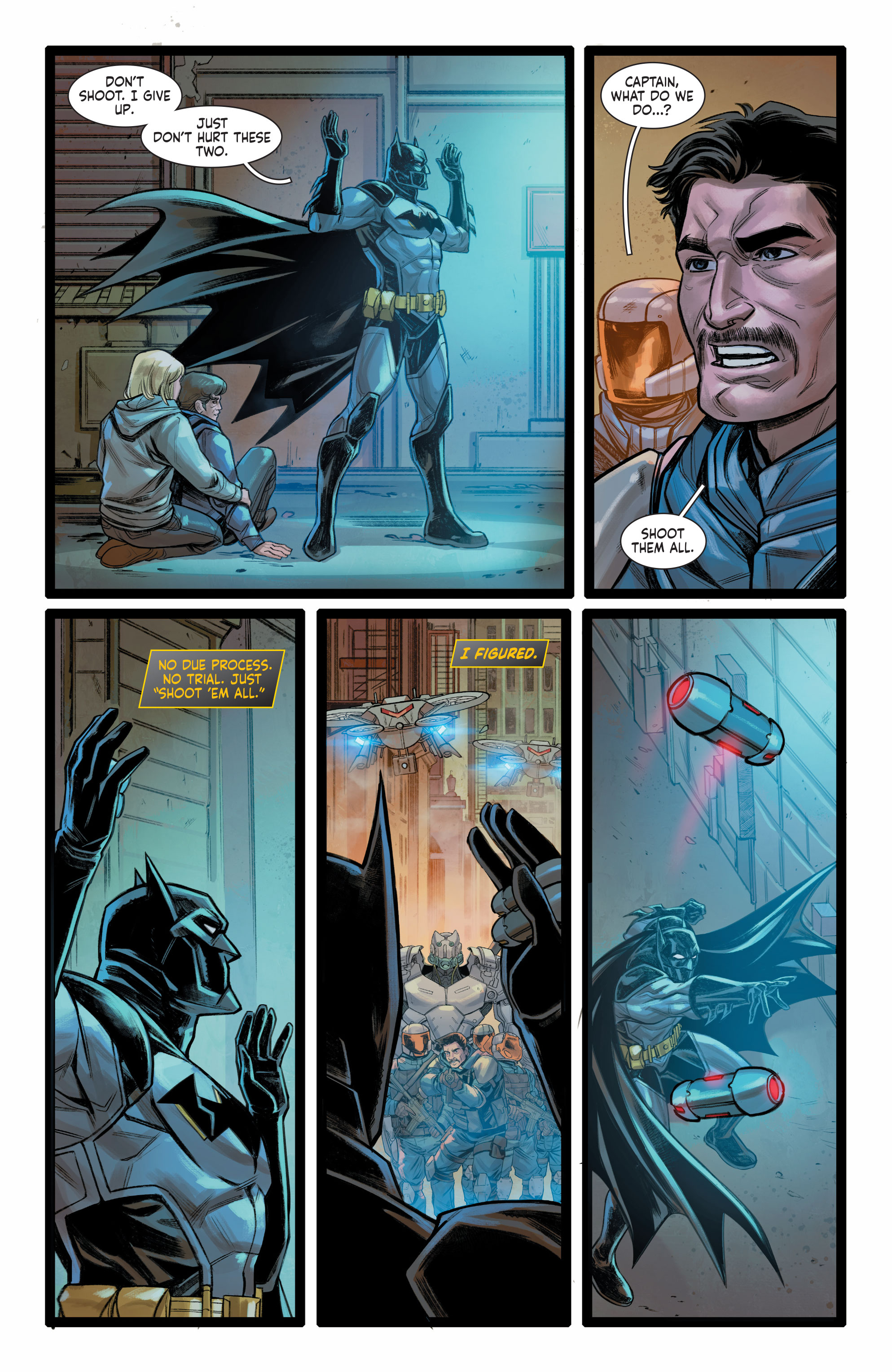
Yeah, The Next Batman really leans into the family aspect. What is so exciting for you about getting to explore Lucius Fox’s family?
It’s been great. Anytime there’s in any entertainment space an opportunity to really excavate Black characters, female characters, LGBTQ+, Asian characters, Latinx character. Not just as characters, but to see them as people. Anytime there’s an opportunity to show marginalized demographics as fully formed people, that some of the biggest issues that they deal with are not necessarily the Joker or the Riddler, but just each other. That we’re not all monolithic. That there’s a greater service sometimes in the ‘tween pages. Those are the kinds of things that make it real.
So to me it’s great writing Batman, and it’s great writing Batman as a person of color, but the things that I really enjoy are just those real little moments where it’s just a line in 22 pages but it has such an impact. And it doesn’t necessarily have to have impact for every reader, it’s not hyper-politicized. But it’s one of those things where for particular audiences they love it because they’ve never really seen a scene between Tanya and Tiff. More page counts with Black women, great! Generational divides, great! However, people read it in that one panel, in that one line. There’s so much going on. And to me, that’s the stuff that I really love.
After The Next Batman you’ve got The Next Batman: Second Son. Could talk about that and how it’s gonna connect and build up to what we’ve seen in The Next Batman?
I guess in its strictest form it’s an origin story, but it’s more than that. It’s really about bridging that space between where Tim has been and where he is in The Next Batman. It’s about what he’s been through, what the Fox family is going through. So it’s a little more immediate than going completely back into the past, but it is going to get us to the now of Jace [Tim] Fox, the whole Fox family, and even Gotham City.
Within that, yes, we will certainly go back to and explain and excavate Jace’s worldview, where he’s been, why he went away, why he feels certain things about his family–particularly his father–and what drives him to want to do more and do better. As well as some very serious mistakes he’s made in his life.
And what about when Jace and Luke Fox finally have their inevitable showdown?
You anticipate these matchups. I mean, the fact that you’re already asking that question, you know you’re anticipating it. It’s like, “Oh my gosh, these two brothers and one is Batman, one is Batwing, and one is more beholden to the legacy of Batman, one is probably less beholden to it. And what’s going to happen in that moment?”
I’m hyper cognizant of what’s coming and what needs to happen and how it needs to play out. But I try to never quite wear a fan hat when I’m writing. And I say that having the highest amount of respect. I hope people realize that with things where I try not to reinvent and try to embrace and keep what’s there. But I do feel like to give people exactly what they want means that they don’t experience fully new things. I want to make sure that in every regard there’s a reverence for things that have happened but that we’re moving into new territories.
So I will say, I know that moment. I know why it’s going to happen. I know essentially when it’s going to happen. My hope is that it would go down differently than any fan would expect because then I feel like I’ve really done my job. They’re expecting a moment where they’re going to meet. How could that not happen? I hope that I deliver it in a way that’s unexpected for the fans but also highly satisfying.
The Next Batman #4 is out on Feb. 16. Tim Fox’s story will continue in Batman: Black and White #3 and The Next Batman: Second Son #1 on Feb. 23.

